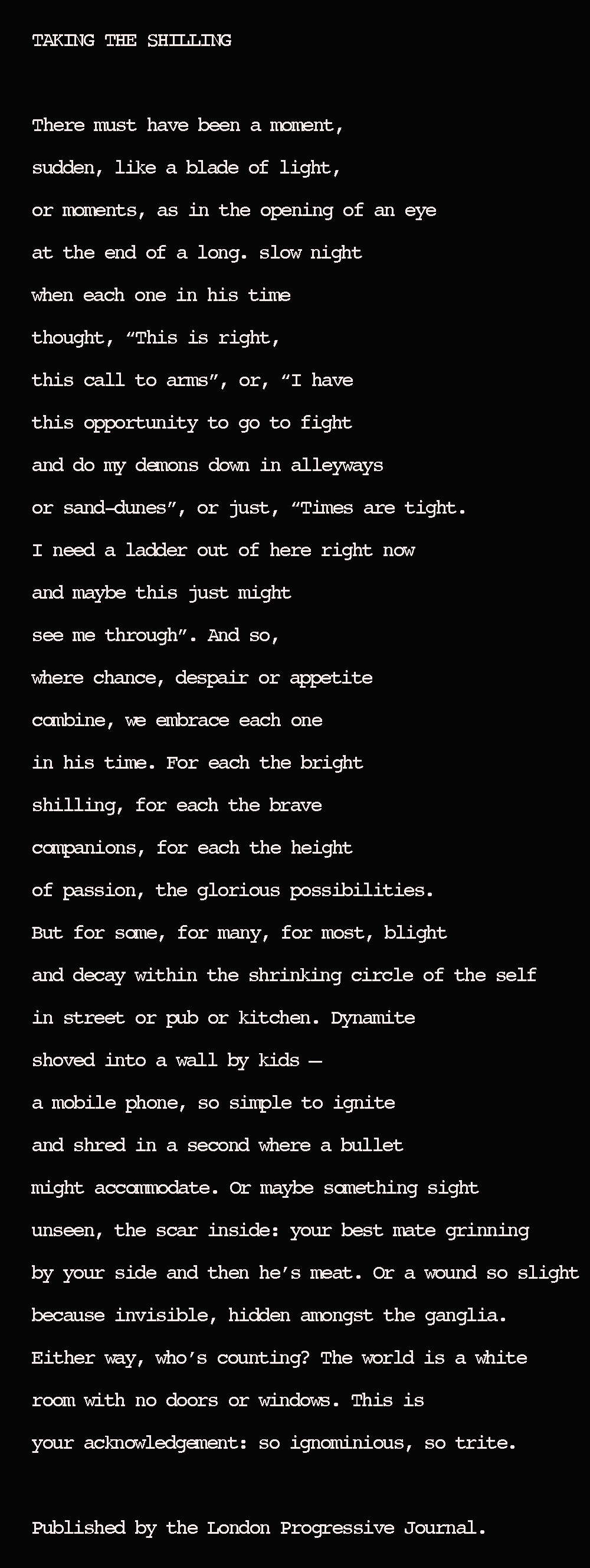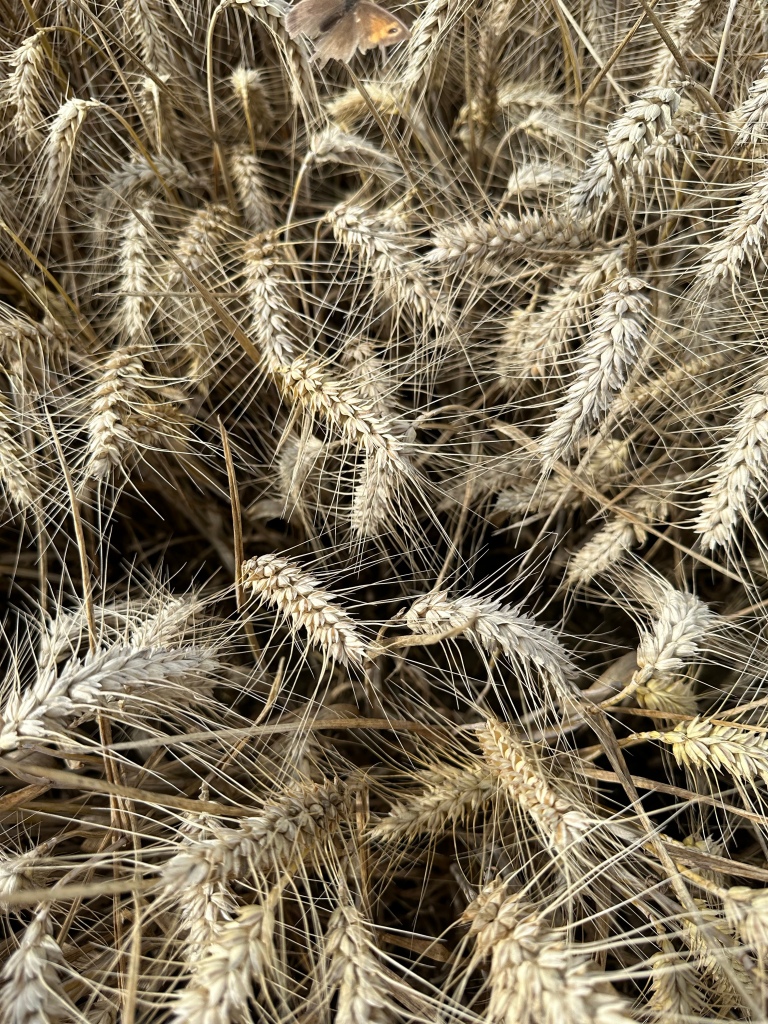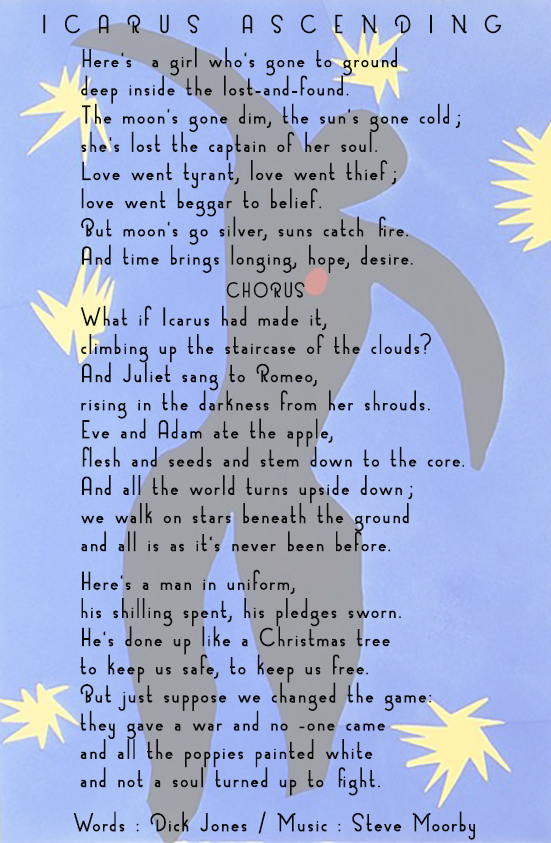This poem has a curious provenance. I wrote it 14 years ago in a white-heat continuity of days. Once started, it spilled out prolifically in long sequences of verses and stanzas – to such an extent, in fact, that I had to carry a mini-notebook in my back pocket so that I could capture the verbiage as it arrived and spilled out. I drafted and re-drafted rapidly into my main notebook and completed a first full version of the longest poem I had ever written some ten days after its initial appearance.
I’m not sure what provoked so fluid a flow. I’d had the opening section – headed Superstructure in this draft – hanging around for several years. The original notion was an anecdotal account of experience working in a mental hospital laundry, but it never got further than a description of the huge gothic edifice that housed the institution. In spite of the fact that my three months in that dreadful place were full of incident, the anticipated graduation to a depiction of what actually went on never occurred.
As so often happens, it was an entirely unconnected stimulus that sparked off the next stage of the poem. During the ongoing (and seemingly never-ending) process of unpacking and sorting documents after our house move, I came across some research and planning notes I had drawn up for a projected production of Peter Schaffer’s play Equus. I had homed in on the play’s central theme – that of the psychiatrist Dysart’s growing fascination with the perverse, amoral theology that has driven his 17-year-old patient Alan Strang to blind several horses with a hoof pick. Appalling though the act is and in spite of the explanatory pathology that emerges through analysis, Dysart becomes increasingly aware of the sacrifice of visceral passion and engagement that Alan must make in order to be liberated from his compulsions. Passion, you see, can be destroyed by a doctor. It cannot be created, observes Dysart. And later, as a cri de coeur: All right! The normal is the good smile in a child’s eyes. There’s also the dead stare in a million adults. It both sustains and kills, like a god. It is the ordinary made beautiful, it is also the average made lethal. Normal is the indispensable murderous god of health and I am his priest.
The planned production never went ahead. A combination of concern about suitability for an all-ages school audience, probable casting difficulties and a sense that Schaffer presents his compelling scenario just a little too tidily had me tucking the notes away and moving swiftly on to something more negotiable. So rediscovering them so long after their compilation gave them a renewed freshness and impact. But instead of causing me to reflect wistfully on the production-that-never-was, I found myself thinking about the poem-that-was-yet-to-be. And I realised within a moment of revelatory shock that aspects of what I had seen and heard in that mental hospital conformed precisely to the informing agenda of Equus. I realised – maybe for the first time fully – that I had been witness to a demonstration of that nexus between the limits of conventional human behaviour and the abandonment and chaos that lies beyond and that it had shocked me to the core. The poem investigates – as maybe only a poem can – the true nature of my perception of the event witnessed at the time and what, with the understanding that only comes with time, it meant to me now.
:::
When I posted the first draft of the poem, a combination of factors inhibited commentary beyond a handful of (very helpful) responses – its sheer length, the density and maybe obscurity of its infrastructure, the judgement that it simply wasn’t a very good poem… All of those elements and more will be in place again this time – compounded, I guess, by the sad fact that my readership has diminished during the past year! But it’s time for a second airing so here it comes again in its second draft.
BINNERS
SUPERSTRUCTURE
Even then it was a dour anachronism, beached
at the tideline of a bleak estate, a great beleaguered
pile – Victorian hubris raised in red brick precipices,
gothic crenellations, totem chimneys, tottering over
fields of scalloped slates. Built by honest burghers
to house the footsliders, the wobblers, the pagan
visionaries, the nihilists, the fallen doves. And the pile squatted on its hill of bones, hoarding in reality
a sad communion of cockeyed optimists, lost souls
whose only act of madness was to let loose hormones in their teens like red balloons, old crocks and crones beyond repair and one or two of the truly damned or blessed.
:::
INFRASTRUCTURE
I work in the asylum laundry,
dawn ‘til two, forking bedsheets,
wet and grey like tripes,
into the drums to cook.
Booted and wrapped, shiny
white in oilskin aprons, angel
butchers, we move through steam,
feeding the ironing room.
We, the furtive and the cruel,
duck behind nicknames, aiming
to pass unnoticed or unchecked
within this strange nation:
Fish, the foreman, with the
glaucous eyes; me, the Friar,
for my pelmet fringe; and
crew-cut Stig of the lipless
v-shaped smile, like a deft
two-stroke razor slice. Ours
is a realm of clouds, high windows
sweating kitchen dew and vaporous
doorways like dream portals, blurred
against white streaming tiles. And
passing between these shape-
shifting airlocks, the strange
quotidian traffic. We sidestep
their world like unshelled crabs,
sidling our tasks between sheet
heap and drum, heads down
and purposeful, breathing only
our own air. And they move
between us in their own
fashion: the dancers, shapeless,
ageless in their smocks,
spinning and turning to
secret tunes in undiscovered
keys; the counting man
who circuits the vast estate,
enumerating fetishes – certain
lintels, keystones, door handles,
a smoked glass windowpane,
a beech tree root, tapping
each one with crooked
magic forefinger and then
moving on to realign
some other crucial fuse
while the sun is high.
(I watch him secretly,
like a bobbing bird at work);
and last, within the dust
of the parade, precarious
as a shard of glass,
red Mary. Fizzing on
the threshold, she tests
the air. Her top lip
puckers, lifts over
a black bucket of
horse teeth. She snickers
and pushes at her brush-
fire hair, a corolla
of torn flames, the colour
of rust. Pale, pale
blue eyes switching and
slipping, making of the world
a place of fumes
and snapped filaments, just
an inkblot atlas to guide her
through black land
and fathomless sea.
And it’s here and now,
within the splay and straddle
of her limbs inside the doorway,
between one clumsy
heartbeat and the next,
that there might be
deliverance – a rough facsimile
of love as nurse or porter
turns her round, the pressure,
gentle, solicitous, the voice
a fuzzy burr, back along
white corridors, white corridors.
But no one’s there
and Stig is sprung-wound
and ticking close beside me.
I can smell his musk
through boiled linen and suds.
Dipping armpit deep into the drum,
he tugs out cotton knickers,
red as a haemorrhage,
and dangling the deep, sad
weight of them like a toreador,
he edges forward. His thin rudiment
of mouth beaks into a pouting kiss
as he sashays onto the walkway
where she stands. In that sweat-
heat, she is, in this moment,
rabbit to his serpent.
Fish draws hard on a cigarette
and turns away, but I am
complicit, witness from the start,
hiding amongst the rank
garment foliage like a naturalist,
sensing that what must now
transpire will strip us
to the quick. Clocks stop
inside that doldrum pause.
And she begins to keen,
a sound thin and high,
like wire hard drawn
through the membrane of
the air. And Stig two-steps
sideways, flicking the bloomers,
chanting on a breath:
“Crazy Mary, crazy bitch,
come on and fuck me, crazy
bitch, come on”, and laughing
high and wild like a child
on a rope over water,
innocent and dangerous
in the free air, he dances,
now scampering forward
and back, forward and back
under a blood-red flag.
The air shimmers and stiffens;
then Mary shatters it like
a huge pane of glass.
There is a quality
of sound – the mud-born
eructation from the throat
of a marsh bird, or
some searing midnight
heartbreak called from ridge
or hillside – that curls
around the edge of time
to bear witness to what
we have never known,
should never have to know.
And Mary shrieks from that
elemental place, her mouth
split earth and her voice
magma, sudden and naked
in the wrong world. Stig
stops dead, poised like
a mural dancer. This
raw noise has clogged
the air into something
like fog or dynamite
and our ears ring with it
and we can’t see for tears.
Stationary, rooted, like
a screaming tree, she flails,
ululating from within the
perfect storm, an ecstasy
of rage, crystal-pure and
targetless, uncorrupted by
concern or issue, red-raw
but of itself, primordial.
From this spotless light,
this impeccable heat, stars
and their matter draw
their source. This is
the ultimate release,
a hideous, intoxicating
freedom. Like some twisted
Breughel sower, she scatters
the molecules of reason
into this coruscating wind
and for its duration
both of us are blasted white,
Stig and I, reamed as clear
and vacant as blown eggs.
And now inside the cone
of silence that crowns
the thunderclap, we stand,
Stig and I, each in
his moment, the one
a still life in white and red,
caught at the edge
of the breath before
panic animates; the other
a dumbstruck initiate,
hearing in the soaring
engine of the scream
a wild music, seeing within
the beating Shiva arms
a terrible beauty, the purity
of free-falling water, the
rootless, boundless liberty of
the infant and the lunatic.
Is this how we sunder
gravity, leave the earth
and fly? Is this shame
I feel or yearning?
They come for her and,
with unconsidered skill, they
truss her as she stands
and bundle her away.
The sounds diminish, dwarfed
and dopplered through the
labyrinth beyond and,
in the laundry, drums
grind and roll and steam
embraces. But I am marked
now, an initiate. I know
of their mission this much:
that it’s not to care
and cure but to contain
and then conceal. These
seismic forces must remain
bound in chains, Promethean.
Neither love nor freedom
can survive the fire from
what we might become.
I fork bedsheets, wet and grey
like tripes, into the drums
to cook. And I must wear
this secret like a scar.
Published in ANCIENT LIGHTS, Phoenicia Publishing © 2011.
:::



